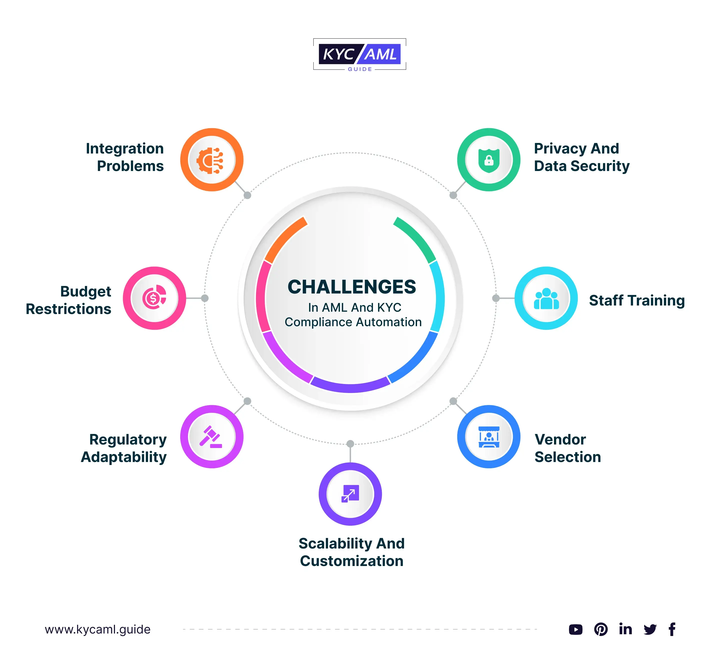What is RegTech?
Regulatory technology, or RegTech, is a new technology that combines the use of digital tools and processes to help organizations manage their growing regulatory compliance obligations. Transaction monitoring, risk assessment, and real-time monitoring of regulatory changes are all common features of automated RegTech systems i.e. automate KYC and AML automation. RegTech can also report and identify suspicious behavior. Many processes that would otherwise be done manually are streamlined by Regtech compliance. Different RegTech systems operate in different ways, but they all use artificial intelligence (AI) and machine learning. These technologies aid in the verification of client identities, the tracking of transactions, the improvement of performance in criminal investigations, and the detection of fraud.
Integration of AI and Machine Learning in RegTech
Historically, AML and KYC compliance has been a time-consuming, expensive, and document-intensive endeavor. Banks and financial organizations must sift through mountains of paper, analyze vast amounts of data, and manually assess consumer attributes.
The two most significant Regtech capabilities for AML and KYC compliance are AI and ML. These technologies enable Regtech solutions to analyze large amounts of data to find trends and anomalies that may suggest fraudulent behavior. AI and ML, for example, can be used to analyze transaction data and identify suspicious transaction patterns that could indicate money laundering or terrorism financing.
AI and machine learning can also be used to assess client risk. AI and ML algorithms can compute a risk score for each consumer by analyzing customer data such as transaction history and demographics. This risk score can be used to determine the client’s level of due diligence.
Why Automate KYC and AML Compliance?
Bank operational costs increased by 25% between 2020 and 2022 as a result of financial crime compliance. Moreover, AML compliance can be costly and time-consuming to maintain.
Automated KYC is critical to resolving this issue and expediting processes. It enables banks to obtain trustworthy data, overcome complicated jurisdictional concerns, and more efficiently deploy resources, assuring regulatory compliance and effective audit trails. Inefficient manual KYC processes can lead to lengthy onboarding durations for business customers, often exceeding 100 days. By collecting data from global databases, automated KYC greatly speeds up this process, decreasing KYC procedures by more than 60%. This improves the consumer experience while also increasing bank operating efficiency.
Finding the proper Regtech solution can go a long way towards lowering AML compliance expenses by allowing organizations to AML automation. The automation and customized rules provided by Regtech compliance enable teams to better prioritize their time and stay ahead of money laundering with more accuracy and efficiency.
How Regtech can Automate KYC AML?
With Regtech compliance and AML automation integrated into the fintech onboarding system, financial institutions can combat money laundering
Identity Verification & Authentication
Regtech software allows fintechs to automate identity verification and authentication by allowing partners access to your KYC database. Using individual integration methods, the new user’s information can be compared to the official documentation of various partners. If the information looks to be fake or does not exactly match the KYC details, the user will be unable to access the website. Otherwise, they can immediately use the financial service.
This creates an automated KYC that eliminates identity theft and fraud associated with new accounts, giving AML experts peace of mind that bad actors are being kept off the platform and allowing them to focus more on their AML initiatives.
Customer Due Diligence
Most fintechs that engage with sponsor banks must do customer due diligence (CDD), therefore maintaining the effectiveness of this process is critical. When customers open accounts, they employ identity verification and KYC information as a type of risk management. The same Regtech tools that are used to verify a customer’s legitimacy during onboarding can provide compliance professionals with access to a customer’s prior transactions and financial behavior, allowing them to check things including their CDD list. A combination of KYC/KYB partners may reveal confidential information such as the Ultimate Beneficial Owner (UBO).
The CDD process can be adjusted, risk and compliance teams can create custom criteria to identify the most suspicious type of KYC data. As a result, they can concentrate their efforts on specifically monitoring these consumers and preventing money sellers by identifying customers through AML automation who pose a danger of money laundering.
Transaction monitoring and screening
The transaction pattern of a customer might be a reliable indicator of money laundering. However, it is difficult for AML professionals at fintech firms to spot illegal transactions when they occur. This problem can be solved swiftly and efficiently by using AML automation transaction monitoring solutions that track consumer behavior and alert users to suspect behavior. These conditions may be sent to the risk assessor for additional investigation.
It can also reduce the time to screen suspicious activities. Regtech compliance employs automated AML transaction monitoring to focus more on upgrading their AML strategy and case management.
Case management and SAR filing
The inability of some fintechs and their clients to complete investigations and file suspicious activity reports (SARS) on time is costing them money. Regtech enables risk and compliance teams to handle case management and automated SAR registration. By viewing the data on a single dashboard, organizations can swiftly finish an investigation by flagging suspect behavior for inspection. Fintechs can maintain compliance by tracking each case with the correct AML automation. Furthermore, they examine and file SARs swiftly to fulfill deadlines and safeguard their customers.
Alert Scoring and Risk Profiling
Being constantly concerned about false positives might impede productivity and make it harder for researchers to concentrate on the important level. As a result, a rigorous AML risk assessment process is required.
Regtech compliance optimizes the effectiveness of your team’s strategy by using alert scoring and risk profiles. Organizations can use an automated KYC tool called an alert to monitor accounts and transactions based on possibly suspicious activities. Furthermore, the risk profile specifies the parameters that determine which consumers pose a significant risk of money laundering. These elements can be evaluated and recommended to analysts and customers in firms that demand attention.
Also read: Risk-Based Approach in KYC AML
Compliance Management and Auditing
Regtech can help fintechs stay compliant in a variety of ways. This implies you’ll be informed of your compliance progress. Risk and compliance teams may swiftly discover legislation that relates to their fintech companies and execute AML and KYC procedures to assure compliance by investing in compliance management solutions. Dashboards can help organizations monitor their compliance processes and employ technology-enabled support to satisfy important criteria.
These solutions save organizations the time and effort required to manually monitor their compliance processes, while also guaranteeing they remain compliant.
Benefits of Regtech in AML and KYC Compliance
Data Analytics and Monitoring
RegTech solutions analyze data in real-time using modern data analytics and machine learning algorithms. This enables financial institutions to detect fraudulent transactions and activity more effectively. As a result, your tools and solutions may monitor client transactions, behaviors, and processes in real time to spot anomalies that could signal money laundering or other criminal conduct.
Faster Onboarding
Manual data collecting is often inefficient, resulting in a longer onboarding process. By gathering data from global databases, automated KYC can streamline this procedure and cut the KYC notification process by more than 60%.
Regulatory Reporting
RegTech aids in the simplification of regulatory reporting requirements. This reduces manual labor and the possibility of reporting inaccuracies. As a result, financial institutions can give accurate and timely information.
Cost Reduction
RegTech can save AML compliance expenses by automating manual processes and increasing efficiency.
Consistency and Error Reduction:
AML Automation boosts productivity and lowers the risk of human mistakes, preparing the fintech for future development, organizational change, and scalability.
Challenges in AML and KYC Compliance Automation
Although RegTech has the potential to significantly improve AML and KYC compliance processes, its implementation in the financial industry faces considerable obstacles. Despite the acceptance of RegTech’s benefits, financial institutions confront numerous challenges when incorporating RegTech systems into their current operations. The key problems that financial institutions confront when implementing Regtech compliance are listed below.

1. Integration Problems
Integration of RegTech solutions into current technical infrastructure is one of the most significant problems. Financial institutions frequently have out-of-date systems and software, making it difficult or difficult to integrate new technology. RegTech solutions must integrate easily with these systems while protecting data integrity.
2. Privacy and Data Security
Financial institutions handle sensitive consumer information. It is critical to maintain the confidentiality and security of this information. RegTech solutions sometimes necessitate access to significant volumes of consumer data, prompting worries about data breaches and compliance with data protection laws such as GDPR and CCPA.
3. Budget Restrictions
While RegTech offers long-term savings through automated KYC, the initial investment may be worthwhile. Small financial institutions may struggle to allocate the necessary budget for the acquisition and implementation of RegTech solutions. However, if the correct tools or models are employed, there is always a return on investment.
4. Staff Training
When new technologies are introduced into an organization, work processes and procedures change, and employees who are accustomed to traditional compliance methods may be hesitant to adjust, which can be a significant obstacle. To ensure that their personnel can use RegTech compliance efficiently, financial institutions must implement substantial training programs.
5. Regulatory Adaptability
AML regulations are continually being updated to meet new risks and weaknesses. Financial institutions must ensure that the RegTech solution they select complies with regulatory criteria.
6. Vendor Selection
It is crucial to select the correct RegTech provider. Financial institutions should choose a vendor with an established track record, high credibility and compliance, and the ability to provide continuing support. Choosing the incorrect supplier can result in implementation issues and low results.
7. Scalability and Customisation
As financial institutions expand, so do their compliance requirements. To handle these developments, RegTech solutions must be agile and adaptable. The difficulty is to design solutions that can adapt to the company’s changing growth conditions.
Bottom Line
Now that you understand how Regtech compliance improves AML regulations and compliance for fintechs, your risk and compliance team may look into a Regtech solution as a way to reinforce AML initiatives. If you have the proper infrastructure in place, you will be prepared to deal with new fraud tendencies that pose a threat to your firm. KYC AML guide offers expertise and guidance to businesses to automate KYC processes and ensure compliance and cost-efficiency, thereby improving their financial crime risk management.





